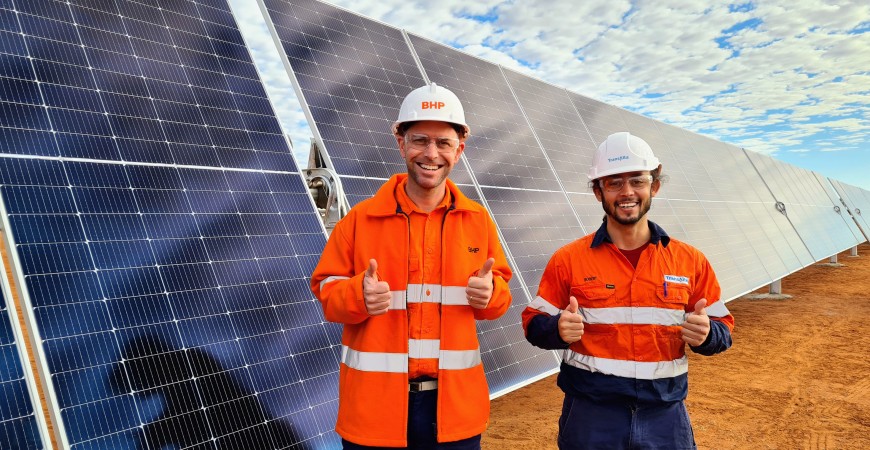It’s one of the biggest questions facing mining companies today: how do we reduce carbon emissions to contribute to the battle against climate change and reduce our economic risk at the same time.
Global clean energy solutions company TransAlta, which has over 100 years of experience building and operating renewable energy facilities, is not only assisting mining companies to do this but is also on its own journey to decarbonise.
TransAlta’s transition from coal to natural gas and renewable energy has reduced the company’s emissions by more than 61 per cent since 2015. It now operates over 50 renewable and energy storage facilities across Canada, the US and Australia with over 7 gigawatts of clean energy capacity globally and a growth target to produce an additional 5 gigawatts by 2030.
In Western Australia, TransAlta is currently constructing two solar farms and a battery energy storage system.
The Northern Goldfields Solar Project was initiated under a Power Purchase Agreement between BHP Nickel West and TransAlta, which aims to provide fuel savings and reduce BHP’s scope 2 electricity greenhouse gas emissions from its Leinster and Mount Keith operations by 540,000 tonnes of CO2e over the first 10 years of operation.
TransAlta also recently announced its own ambitious ESG targets, including a further reduction in annual emissions to 75 percent by 2026 and 40 per cent female employment among all employees by 2030. Currently, women employees represent 21 per cent of all employees.
Ambitious but also probable given the company’s already big reduction in carbon emissions to date and its commitment to gender diversity. In 2020, women made up 43 per cent of TransAlta’s executive officer team and 45 per cent of its Board, with equal pay achieved for women in equivalent roles as men.
Although there are many obvious benefits to meeting these targets, one financial advantage TransAlta has secured is a Sustainability Linked Loan (SLL).
Through the SSL, TransAlta has further underscored its dedication to sustainability by aligning the cost of its borrowing with its greenhouse gas emission reductions and gender diversity performance.
An SSL provides flexibility and the potential for real economic benefits and positive ESG change where the borrower is rewarded with a decrease in its borrowing costs based on the year’s performance.
TransAlta’s loan has a cumulative pricing adjustment to the borrowing costs on the facilities and a corresponding adjustment to the standby fee. Depending on performance against interim targets that have been set for each year of the credit facility term, the pricing adjustment is structured as a two-way mechanism that could move either up, down or remain unchanged for each sustainability performance target.
Not only are emissions reduction and increased diversity the right things to do by planet and people, as TransAlta’s example shows, they are also the smart thing to financially.
Note, TransAlta is a client of ReGen Strategic.
 ReGen Strategic
ReGen Strategic